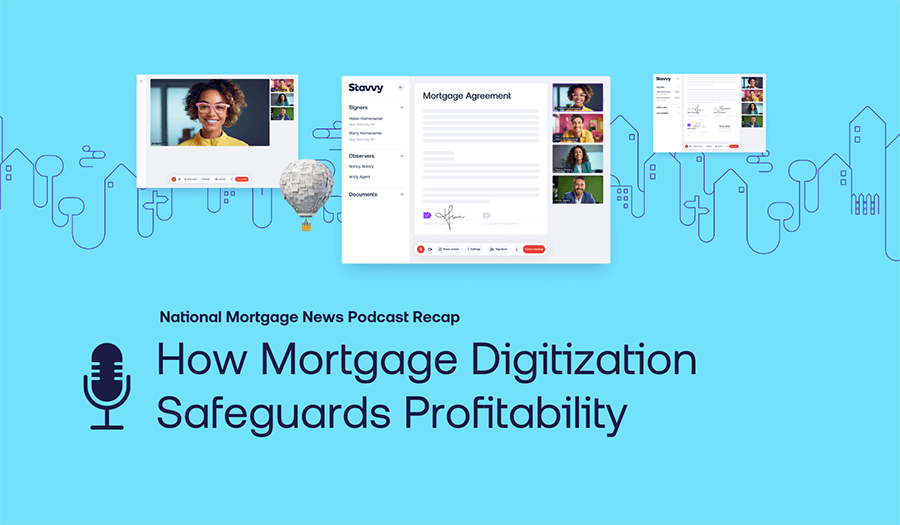The real estate, mortgage, and title industries have experienced much innovation in recent years.
From eNote to remote online notarization (RON) and eSignatures, the technology and legislation needed to take real estate closing online are proven and available. However, hesitancy to adopt has been a roadblock to widespread eClosing adoption, particularly amongst mortgage lenders.
A new take on real estate closing isn’t slowing every mortgage professional down. While lenders work through their digital mortgage closing strategies, many title and settlement agents are embracing eClosing and its benefits for seller-side and buyer cash transactions. The federal government may be helping to remove uncertainty, too, with the SECURE Notarization Act and accepting digital closing with eSign, eNote, and other digital collateral.
Lynne Tucker Chandler, a highly regarded mortgage industry expert and Ginnie Mae’s Digital Collateral Program Director, is optimistic about the future of mortgage digitization. She believes the mortgage industry has been waiting for the federal government to enter the digital mortgage space. Now that they have, digital mortgage closing adoption is sure to follow.
“We’ve had a great interest since we announced [the Digital Collateral Program]. There were a lot of people who were sort of just waiting for Ginnie Mae or for the federal government to get into the space, and we’re happy to be here. We’re happy to serve that part of the market.”
- Lynne Tucker Chandler, Digital Collateral Program Director, Ginnie Mae
What started as a small pilot program with limited participants, today, Ginnie Mae’s Digital Collateral Program governs the securitization of eNotes and related policies for VA home and FHA mortgages. As the program’s director, Lynne has a unique perspective on who utilizes eClosing components like eNote, and why mortgage professionals should switch to digital.
Lynne joined Jeremy Potter and Kosta Ligris on Stavvy’s Finside Chats® podcast to discuss the benefits and obstacles of digital mortgage closing, eNote, and offer insight on where the mortgage industry may be heading.
On this episode of Finside Chats®, you’ll learn about:
- How the entire mortgage ecosystem benefits from eClosing and eNote
- The obstacles to the widespread digital mortgage closing adoption
- Where digital mortgage technology may be headed and what milestones have already been reached
Listen now: Digital Mortgage Closing and eNote Securitization from Ginnie Mae
The advantages of digital mortgage closing and eNote for homebuyers
Digital transformation in the mortgage industry has one common goal—creating simpler, more accessible real estate transactions with technology. And for Ginnie Mae’s Digital Collateral Program, that statement couldn’t be more accurate.
The securitization of eNote and other digital collateral has made it easy for homebuyers to participate actively in a real estate transaction, regardless of physical geographic location. Digital real estate closing has benefited military service members, working individuals, and families by allowing signers to complete a secure real estate transaction online without calendar coordination, lengthy transaction times, childcare, paper, and postage.
“We’ve had a great uptake from VA lenders in particular. About 70% of our digital collateral is VA-backed eNotes, and we love that another part of the federal government is embracing [digitization]. We can serve our nation’s service members if stationed overseas or in another state. They can still participate directly in the homebuying process, and it eliminates a lot of thorny paperwork issues as well,” says Lynne.
Lenders benefit from digital mortgage closing too
While lenders have long understood that digital closing provides a better customer experience, Lynne shares that many lenders are beginning to see the efficiency eClosing technology poses for their business operation, too, particularly as it relates to real-time quality control.
“Our lenders report value, especially in the post-closing space. You’ve eliminated all the hassles you might encounter, from ‘Oops, you forgot to sign a page, or you mailed out a document, and it never made it, or I live in a small town, we don't really have a notary.’ All those little oopsies that bogged down your post-closing process can go away. And we are definitely hearing about the benefits in both time to close or in time to finalize the package. Also in money saved, because of the efficiency,” says Lynne.
The obstacles to broader digital mortgage closing, eNote, and technology adoption
While the benefits of adopting eClosing and implementing technology are numerous, there are still obstacles the mortgage industry must overcome.
“For a long time, Fannie Mae and Freddie Mac did a whitepaper where they kind of concluded that maybe the warehouse lenders were not comfortable yet in this space, and maybe that was a roadblock. That's not a roadblock anymore. I'm here to tell you I've talked to several of them. And they wanted to talk to me because they wanted to understand how Ginnie Mae uses the secured party field on the MERS® eRegistry and how that's a little bit different from the way Fannie and Freddie have been doing eNotes so they wanted to get comfort around our process and sort of what's unique to our process, but they are absolutely on board. They are funding Ginnie Mae eNotes. And so that's not the obstacle anymore,” shares Lynne.
Lynne also reflects on her experience on the North Carolina eMortgage Closing Committee and how they’ve succeeded with eNote adoption.
“I'm also pleased to be a part of the North Carolina electronic closing committee where they're doing more of a grassroots ground-level look at this. They're working with real estate professionals and sort of more like on-the-ground folks. I think that's where we have to do it at this point; they have a 9% eNote ratio, as opposed to the national ratio of about 6%. And so something's working for them, you know, by attacking it locally like that.”
While the industry wishes we could look into a crystal ball to unlock the mystery of digital adoption, there are steps we can take today to keep eClosing moving forward.
Kosta and Lynne agree that it’s essential that the mortgage industry continue to focus on the title and settlement company and real estate attorneys' roles in a digital mortgage closing and provide them with the tools and education they need to drive mortgage digitization forward and navigate misconceptions.
For example, even if remote online notarization is unavailable in their state or service area, they can still advocate for and perform a hybrid closing with eNote—a monumental step forward for digital mortgage transformation, and a topic we’ve uncovered on the podcast before with Simon Moir, Vice President and Segment Leader at Wolters Kluwer Compliance Solutions. You can listen to Mortgage Digital Transformation: It’s Time for eClosing and eNote here.
There is no right or wrong way to introduce a digital approach to mortgage closings. We must start somewhere and allow professionals to do what feels most comfortable.
The future of eNote in the digital mortgage closing process
There is a lingering belief that many lenders aren’t sold on eNote, but Lynne shares an opposing perspective.
“On the business side, there’s really no lack of enthusiasm. I have companies willing to invest, they’ve made it a priority, and they just need to be connected with the right vendors to support their process.”
It remains to be seen how the mortgage industry will continue utilizing technology moving forward. However, Lynne thinks we’re on the right track, even if that means taking a crawl, walk, run approach to eClosing and technology adoption.
“Let’s say you want to have just any eClosing platform to start, even if it turns out paper notes…maybe that’s step A, and then you get to step B and step C. We’re watching who’s using RON, who’s using eSignatures, and who’s using all these other digital closing components. Once they get a comfort level with that, hopefully, they’ll also start to see the ease and value of the eNote.”
Learn more about how the  is taking real estate beyond documents.
is taking real estate beyond documents.



![[Webinar Recap] Advancing Your Digital Default Servicing Strategy](https://blog.stavvy.com/hubfs/advancing-your-digital-default-servicing-strategy-blog-recap.png)